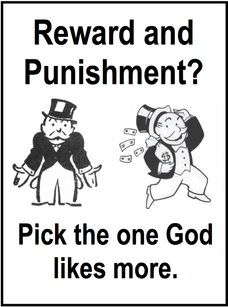| This week's Torah portion (Ekev) includes this section, which the ancient rabbis designated for the second passage of the Sh'ma: When you hear My mitzvot, which I enjoin upon you today, to love and serve Adonai with all your heart and all your mind, I will bring rains to the land in season—spring and autumn rains. You will gather your grain, wine and oil. There will be grass in the fields for your cattle. You will eat your fill. Take care not to be lured to serve false gods and bow to them, for Adonai’s anger will flare against you and God will shut the skies; there will be no rain and the ground will not yield its bounty. You will soon perish from the good earth that Adonai gives you (Deuteronomy 11:13-17). |
The problem with the passage is the problem of how we view divine reward and punishment. The early reformers argued that the passage seems to say that all good fortune is a reward for good behavior, and all misfortune is a punishment for bad behavior. Such a belief is neither supported by what we observe in the world, nor is it ethically defensible. We know that there are, in fact, many good and innocent people who suffer catastrophes and there are many evil people who enjoy pleasure and comfort. The passage is, at best, troubling.
But who says that we should reject everything in Torah that makes us troubled or uncomfortable? Once the red ink starts in editing the Torah, it is difficult to keep it from flowing onto every page. I would prefer to see what is truthful in the passage and also to acknowledge the discomfort. I would rather argue with the Torah than ignore it.
We can view the passage as a poetic statement of the general idea that "what goes around, comes around." People who live lives of caring, love and compassion do tend to reap a harvest of joy and fulfillment in their own lives—even when misfortune falls. People who live lives of selfishness and hard-heartedness do tend to suffer from isolation and fearfulness—even in the midst of material comforts. You cannot say that it works that way in every case, but it is a generally truthful statement about our lives that is worth teaching and repeating.
It is also worth remembering that the theology of this passage is not consistent throughout the Hebrew Bible. There are other sections that appear to be direct counterpoints to Deuteronomy's theology of reward and punishment. In particular, the book of Job seems to be in a twenty-five-hundred-year argument with the book of Deuteronomy.
The book tells the story of Job (Iyov in Hebrew), a righteous man who is punished by God. When Job asks God why he has been made to suffer despite all his good behavior, God famously responds with a non-answer: "Where were you when I laid the earth’s foundations? Speak if you have understanding" (Job 38:4). In contrast to Deuteronomy, the book of Job acknowledges that the good do suffer, but that it is beyond the ability of human beings to understand why. We were not there at the creation and we are not privy to God's plans.
Deuteronomy says that our suffering is, in part, our own fault. Evil things happen to us because of our failings to sanctify God's presence in our lives. Job says that we have no answers to questions about human suffering. We can only hope to respond with reverence to a God who is beyond our understanding.
It is possible that neither answer will satisfy us. We may feel tempted to say that everything is random and there is no meaning—hidden or knowable—to explain the universe. But, if that is so, then our lives, also, have no meaning and there is no significance to anything we do in life, good or bad. I prefer to think that truth lies somewhere between Deuteronomy and Job.
There is a divinity that shapes our ends—to coin a phrase—and our actions do play some role in hewing them. However, it is not for us to understand exactly how or why some suffer and others enjoy fortune. We try to make the best choices we can in life, not in order to receive a reward, but because the choice itself is its own reward.


 RSS Feed
RSS Feed
